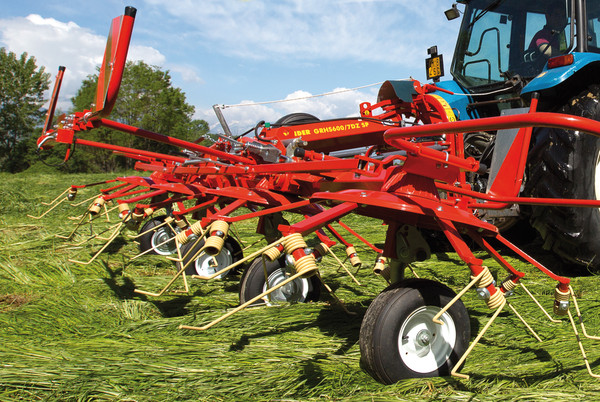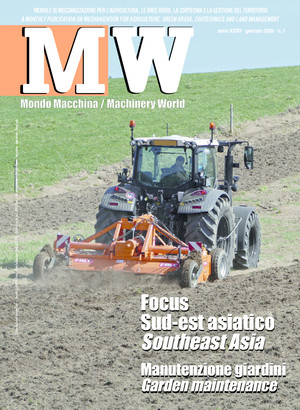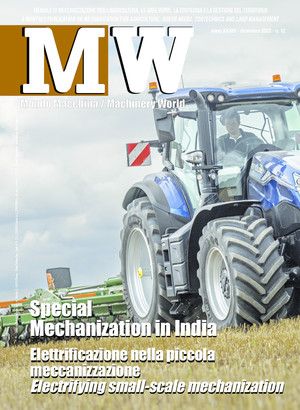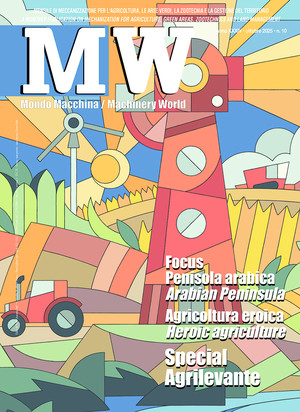
Frandent Group: avant-garde technologies for soil preparation
A manufacturer which went to work at the end of the 1970s building power harrows to then expand the Frandent range with the introduction of haymaking machines. In 2006 a new manufacturing facility was inaugurated designed around lean production system criteria with the application of avant-garde eco-sustainable technologies
A small mechanics shop in the Piedmont town of Cavour, in the Turin metropolitan area, and a winning idea for the creation of a power harrow led to a patent and especially to great enthusiasm for going to work. This is the story behind the founding of the Frandent company (1977) with a trademark portraying the memory of that first model, given a name based on the initials of two components of the machine, fraditori and denti, sod-breakers and tines. The years in which the manufacturer was taking its first steps were troubled and complicated, in a climate of strong social and political tensions, a period when entrepreneurs’ activities often wound up in a ditch. In the meantime, the Frandent founders moved the company from Cavour to Osasco, still near Turin, and fought discouragement by devoting greater energy to the growth of the enterprise and widening the range of products. Power harrows remained Frandent’s core business joined by tedders and rotary rakes. These machines laid the groundwork for the first real success for the company’s business with the 1992 introduction of the innovative Frandent Eternum rotating harrow series equipped with conical bearings to flank the tedders in the GRH series and the line of RA rotary rakes. The the real leap forward came in 2002 when Frandent machinery was given certification by ENAMA, National Agricultural Machinery Mechanization Agency, after the company’s move to the new high-tech plant. Ezio Bruno, speaking of his father’s testimony as the head of the company, told Mondo Macchina/Machinery World that the factory site “was designed according to the Lean Production System principle organized on the basis of identifying and eliminating waste and all operations which do not create value added for the end-user.” Under these terms, the leading innovations involved production processes with the introduction of a linear approach for bringing the individual components to the point of the assembly of the completed machine; robot islands for precision high quality welding; a vertical automated warehouse for the rationalization of storage bulk and managing supplies with the Kanban system, the Japanese manufacturing system in which the supply of components is regulated through the use of an instruction card sent along the production line. Frandent also worked to give the plant an eco-sustainable side for ensuring maximum energy efficiency by fueling boilers generating energy with biomass, a system still used for radiant underfloor heating as well as the automated painting line, exclusively using paint with low impact on the environment. Other than the manufacturing plant itself, the Piedmont company has available two trial circuits for tests and fine tuning to make certain that the machines meet wear requirements in extreme conditions. The track for soil preparation machines is a circle of 50 meters in diameter built in cement and stone, and for haymaking machinery testing the course is an ellipse and made of clay which is flooded with water for the tests. These two circuits are where technical innovations are created and perfected for the Frandent wide and differentiated ranges of machinery marketed in more than 100 models in categories according to the manufacturer’s original business in soil preparation, 80 machines with work widths from 90 cm to 8 meters, and haymaking. In this latter sector, the company markets some thirty machines in the Classic series for small and medium size land areas, the Profi, for medium and large extensions of land, and the flagship Super Pro built for super professional operations. Beginning in the small workshop in Cavour in 1977, the technologies developed by Frandent have enabled the company to reach out as far as Japan and South Africa to conquer world markets.








